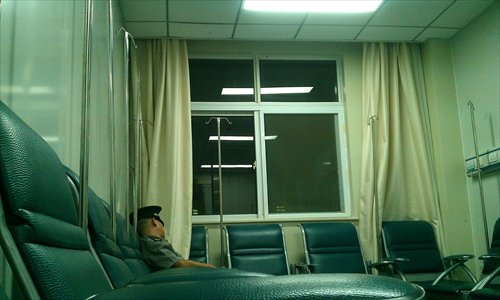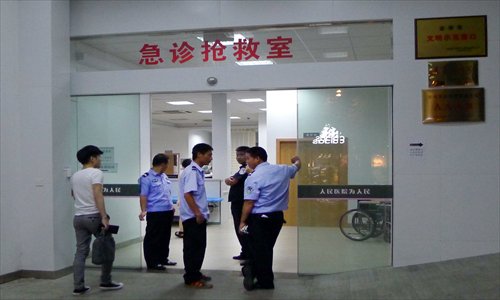Doctors in danger

Following years of violent assaults on doctors and nursing staff some of which have resulted in deaths, China's government is clamping down on violence in hospitals nationwide. On October 12, the National Health and Family Planning Commission announced that hospitals must have security guards and that the number of guards should equal 3 percent of the total medical staff - or one guard for every 20 inpatient beds.
In August, a report by the Chinese Hospital Association revealed that hospitals in the country now averaged 27 violent incidents involving medical staff annually. Last December, the China Hospital Management Association noted in a paper published in December in the medical journal Chinese Community Doctors that disputes had been rising nearly 23 percent annually since 2002.
Soon after the new regulations were introduced however there were reports of attacks on doctors in the provinces of Guangdong, Liaoning, and Zhejiang. In Zhejiang on October 25, Wang Yunjie, a chief physician with the ear-nose-throat department of the First People's Hospital of Wenling, was stabbed to death by an angry patient.
Shanghai hospitals have also experienced violent attacks. On October 17 at Shanghai Shuguang Hospital, in order to show they disagreed with the hospital's care, six or seven relatives of a patient broke into the intensive care unit trying to stop medical staff treating their relative. They smashed equipment and physically and verbally abused the doctors and nurses present. The police in Huangpu district said the two principal offenders had been arrested.
Shanghai news outlets have been reporting that some of the city's major hospitals have not yet appointed the numbers of security guards demanded by the new regulations. When the Global Times contacted the prestigious third-tier hospital Huashan Hospital (Chinese hospitals are classified with third-tier hospitals being the best rated), the head of the press office, Dai Runming, said he was aware of the regulations but declined to reveal the current number of security staff or relevant information.

Penalties not specified
There are doubts as to whether the new regulations are enforceable (the regulations do not specify any penalties for hospitals not employing enough security guards) or whether they will be effective in curbing the violence which has cast a pall over hospital safety and is one reason given by young people for not wanting to take up medicine as a career.
Liu Da (not his real name) is a gastroenterologist at Zhongshan Hospital, another leading hospital in Shanghai. He told the Global Times that he felt the new regulation was as yet "no more than a rumor" - he was sure that no additional security staff had been employed at his workplace. And Chen Huifen, the director of Zhongshan's press office, echoed this view. "Increasing the number of security guards is more like a suggestion," Chen said.
Liu said that whenever there had been violent incidents at the hospital, in his experience the security guards had always arrived at the scene too late. One of his colleagues at the hospital, a surgeon surnamed Huang, said that when there were assaults doctors or nurses had already been hurt by the time the security guards came.
Liu did not believe his hospital would increase the number of security guards because of the regulations. "The government asks hospitals to increase their security but there is simply no funding to support the recruitment. It is totally unfair if the financial burden is all down to hospitals when it comes to protecting the well-being of medical staff."
On November 2, a young Shanghai woman Yu Jiaying went to Shuguang Hospital, a hospital which had experienced violent conflicts recently. But she told the Global Times the only security staff she saw were those in the parking lots. She said she saw none in the halls, emergency rooms, or corridors outside consulting rooms. The hospital's press office has been unreachable by phone since late October.
However other hospitals, according to some city media, have strengthened their security teams. The Shanghai Morning Post reported that by the end of October many hospitals had set up systems where guards regularly patrolled outpatient departments and wards. Some hospitals were assigning security guards to emergency outpatient areas and other places where conflicts were likely to occur.

Patient with a knife
One Shanghai surgeon told the China Youth Daily that after the Zhejiang incident, the emergency department in his hospital had to treat several more angry or disturbed patients than usual. Security guards there helped keep matters in check. The report said that on the night of October 30 one patient lost his temper after a long wait for CT scan results but security guards and nurses talked the man out of a physical confrontation. When in late October one man arrived in the emergency department of a second-tier hospital with a knife and demanded to be seen immediately, alert security guards persuaded him to surrender his weapon and queue like the others.
But these positive stories do not impress the gastroenterologist Liu and his colleagues who do not believe more security guards would help medical staff threatened by real danger. "In the cases involving physical assaults that I know of, the most the security staff could do was talk. To stop the assaults and have the attackers evicted the doctors and nurses had to call the police," Liu said.
When the Global Times visited a third-tier hospital in Xuhui district on November 1, Zhang Yijun was the security guard on duty in the emergency department. The Anhui-born man in his late 40s had been working in the hospital for a decade after losing his job at a factory, but patrolling the emergency department was a new role. He said the hospital now had about 100 security guards and this met the requirements of the new regulations - there were between 1,900 and 2,000 beds in the hospital.
He said he had had no experience when he started and had no real training. His accommodation and food was provided by the hospital, and his monthly pay hovered somewhere between 1,500 ($246) and 2,000 yuan. According to a Shanghai Morning Post report, most security guards in Shanghai hospitals are like Zhang - they are in their 40s and 50s, low-paid, and lack training.
Human shields
Zhang said his job was to "calm down" angry patients and their relatives. "Of course physical and verbal assaults are forbidden. If things get violent, we act as human shields between the attackers and the doctors. Sometimes it works, but in most cases it gives the police time to arrive."
In some incidents patients and relatives had carried knives or weapons, but Zhang and his fellow security guards have no right to search them.
He said there were "minor conflicts" - mostly verbal abuse and cursing every day where he worked. But on average he said there were more than 10 physical assaults every month. He himself had been struck in the face a couple of times, scratched and kicked.
Many newspapers have also pointed out that security guards are limited in their ability to protect medical staff. The Jiefang Daily noted that security guards had no legal authority and therefore could do little to maintain order. The Southern Metropolis Daily said often security guards wound up being the victims. During a violent incident at Wuhan Union Hospital in September 2009 in Wuhan, Hubei Province, several guards were hurt and one was seriously injured.
Other commentators have suggested that increasing the number of security guards could backfire. Zhao Zhijiang, a columnist for several newspapers throughout the country, told Xinhua Daily Telegraph that more security-conscious hospitals would lead to a situation where the divide between hospitals and patients became only more apparent and stressful. "If the solution to hospital-patient conflicts is to create a superior show of strength over the other side, I am afraid there will be no positive outcomes, just a fomenting of their hostilities."
Disturbing presence
Han Su is a 40-something insurance company employee who went for an examination at the ear-nose-throat department of the third-tier hospital in Xuhui district. She told the Global Times that she had noticed the security patrols. "Most patients come here and queue for hours without complaining - they are upset enough to be here. Something is wrong with them and it might be serious. The sight of security guards watching over the place just creates more uneasiness. Personally, I am disturbed by their presence," Han said.
These security guards were dressed in their ordinary uniform, shirts and navy blue suits. But at the Xixi Hospital of Hangzhou, according to chinanews.com, security guards are now wearing helmets and carrying batons and walkie-talkies.
Some experts have suggested that a better solution is not increasing security at hospitals but establishing a more effective medical disputes mediation body. In Shanghai, every district has a medical mediation office and between January and September this year the offices handled 2,255 medical disputes and reportedly dealt successfully with 1,727.
The staff at the Changning office are professional mediators with backgrounds in medicine or law. The medical teams examine the medical aspects thoroughly and join the lawyers in assessing the responsibilities of the hospitals. When both sides agree on the office's recommendation, they sign an agreement which will be legally endorsed by a court.